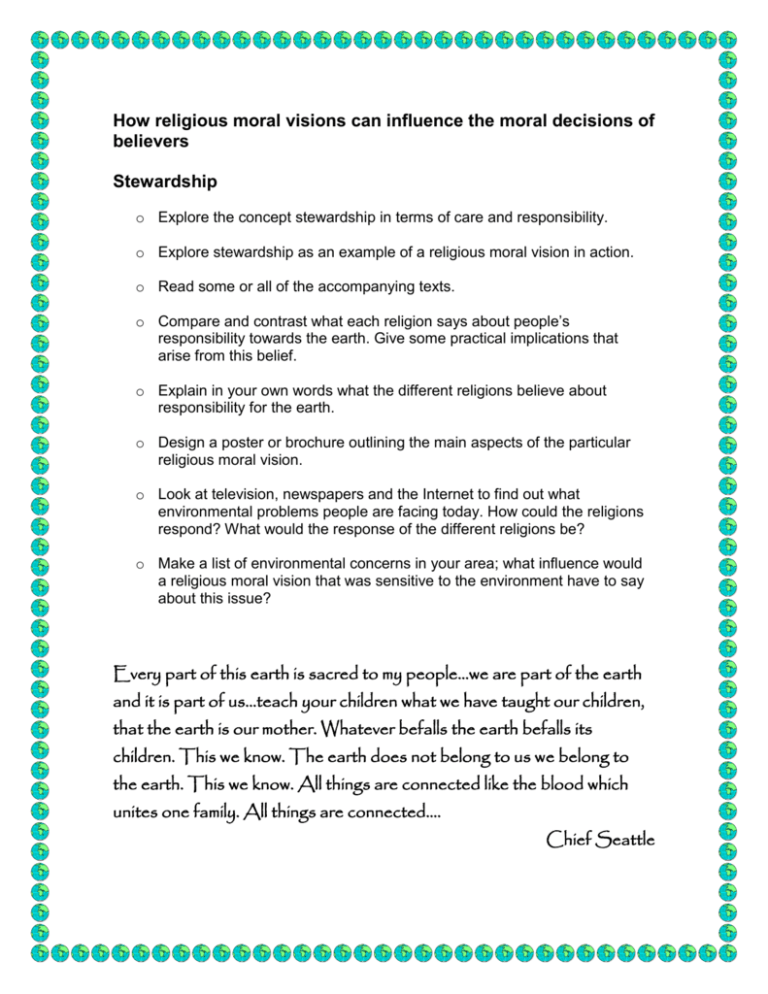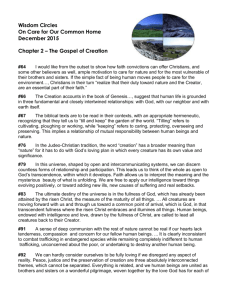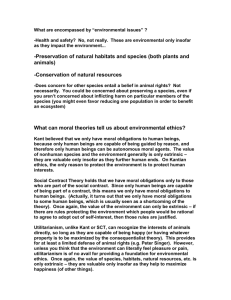How religious moral visions can influence the moral decisions of
advertisement

How religious moral visions can influence the moral decisions of believers Stewardship o Explore the concept stewardship in terms of care and responsibility. o Explore stewardship as an example of a religious moral vision in action. o Read some or all of the accompanying texts. o Compare and contrast what each religion says about people’s responsibility towards the earth. Give some practical implications that arise from this belief. o Explain in your own words what the different religions believe about responsibility for the earth. o Design a poster or brochure outlining the main aspects of the particular religious moral vision. o Look at television, newspapers and the Internet to find out what environmental problems people are facing today. How could the religions respond? What would the response of the different religions be? o Make a list of environmental concerns in your area; what influence would a religious moral vision that was sensitive to the environment have to say about this issue? Every part of this earth is sacred to my people…we are part of the earth and it is part of us…teach your children what we have taught our children, that the earth is our mother. Whatever befalls the earth befalls its children. This we know. The earth does not belong to us we belong to the earth. This we know. All things are connected like the blood which unites one family. All things are connected…. Chief Seattle Islam Muslims believe that Allah has handed the planet over to humanity to look after, cherish and protect it. Human beings are to be the guardians of the earth, responsible for every part of it. They are not to damage or destroy it. Muslims believe that the Earth was created out of love and therefore should be sustained out of love. The Muslim desires to live at peace with nature and to bring about its wholeness. The duty of each person is to care for, and manage the earth and its resources on behalf of the Creator. “It is He who has made you vice-regents, heirs to the earth”, sura 6:165 Muslims have a responsibility to stop the destruction of the planet, no living thing should be killed unless it is necessary, and the ill-treatment of animals is forbidden. On the Day of Judgement Muslims expect to be asked about their responsibilities towards Allah’s earth and the creatures on it. “The earth is green and beautiful, and Allah has appointed you his stewards over it. The whole earth has been created a place of worship, pure and clean Whoever plants a tree and diligently looks after it until it matures and bears fruit is rewarded If a Muslim plants a tree or sows a field and humans and animals and birds eat from if, all of it is love on his part.” Prayer of Muhammad He has made the sun and moon Follow their regular courses. From the herbs to the trees Everything acknowledges his supremacy. He has raised the firmament above to keep the right balance So that none may transgress And upset the balance of creation. Sura 15:5-8 Judaism Judaism teaches that this is God’s world and that humanity is entrusted with its care; this care is a moral duty. All people are commanded to behave towards all creation with justice and compassion. For Jews environmental concerns have to take account of the special place of humanity in creation. The human dimension must have a central place in a discussion about the environment. In Judaism people’s health and well-being comes before commercial interest. Genesis 1 and 2 - The Torah tells us that human beings being were put on this planet to work it and look after it. Deuteronomy 20:19 When you lay siege to a city…you must not destroy its trees by taking up an axe against them…for the trees of the field is the person’s life… wasting resources us a misuse of the position God has given us. Numbers 35:2 the migrash– was an open area of land surrounding towns which was to be preserved as open land, no one was permitted to grow crops or set up business there it was to be a place for the people to rest. Deuteronomy 25:4 “You shall not muzzle an ox while it is treading out the grain.” Deuteronomy 5:12-15 The traditions of Sabbath and Jubilee – every seventh year the land was to lie fallow so as to allow it to restore itself. A young child walked through the countryside with his father. He reached up and plucked a leaf off a tree. His father bent down and shook his head, “No, my son,” he said to him gently, “at the time of creation God decided that this leaf should grow on this particular tree at this very time. Everything in nature is put there to serve God’s purpose. We can use them for our needs, but we must be careful not to destroy things unnecessarily.” A story told by Rabbi Schneersohn Hinduism Hindus follow the ethic of ahimsa, which means they avoid harming other living things, including trees, plants and creatures. Hindus believe that all creation is a part of the Creator God and therefore deserves reverence. It is given in trust to people for their enjoyment. Hindu worship includes respect and concern for mountains and rivers as well as animals, birds plants and trees. Some of these are regarded as sacred – the peacock, the mouse, the bull, the tiger, the banyan tree and the papal (fig) tree. When humans interfere with nature for profit it often upsets the natural balance of the environment with serious consequences. Now see, O Arjuna, in my body the entire Universe – movable and immovable – and whatever else you wish you see” Bhagavad Gita 11:7 Because the earth is sacred, Hindus offer worship to the plot of land where they plan to build a house. Devout Hindus say a prayer to Goddess Earth every morning “O Goddess Earth, the consort of Vishnu, you whose garments are the oceans and whose ornaments are the hills and mountain ranges, please forgive me as I walk on you this day.” A Hindu prayer The cow The cow was especially useful as the early settlers in the Indus valley were farmers. Cows gave milk and were used for working the fields, their hide was used for battledrums, footwear and clothing. In the early centuries of the Common Era the cow’s usefulness took on a sacred character, killing a cow was considered a sin, over the years the cow came to be considered as having divine status and today is worshipped. Killing cows is banned in India. Retirement homes called gowshalas are provided for elderly animals. “Cows should be treated by us with a sense of gratitude. In Indian socialism, they occupy an equal place with the humans. Therefore cows must be respected, as we do to our own mothers.” D.N. Khourody A large majority of Hindus are vegetarians because of their strong belief in ahimsa. Christianity Christians believe that God created the Earth and that human beings are the stewards of creation. They believe that human beings should work wisely to protect what has been given to them and work with nature. God’s creation is good and the responsibility of the Christian towards creation is to ensure that it can manifest God’s glory. o God created the earth o God continues to be present in the world o God made human beings stewards of creation o God’s world has been spoiled and exploited by greed and selfishness o Humans should wisely protect what has been given to them o Nature should never be exploited Genesis 1, 2 Psalm 8 Job 38:4-7 The U.S. Midwestern Bishop’s Statement 1980 Strangers and Guests 1. The land is God’s 2. People are God’s stewards on the land 3. The land’s benefits are for everyone 4. The land should be distributed equitable 5. The land should be conserved and restored 6. Land-use planning must consider asocial and environmental impacts 7. Land use should be appropriate to land quality 8. The land should provide a moderate livelihood 9. The land’s workers should be able to become the land’s owners 10. The land’s mineral wealth should be shared “The dignity of nature as creation needs to be bound up with our responsibility for the preservation of life.” The World Council of Churches “The world is God’s creation and therefore it is sacred…we must love the land and look after the Earth in its glorious diversity.” Bishop Simon Phipps The Canticle of the Sun Most high, all powerful, all good Lord! All praise is yours, all glory, all honor, and all blessing. To you, alone, Most High, do they belong. No mortal lips are worthy to pronounce your name. Be praised, my Lord, through all your creatures, especially through my lord Brother Sun, who brings the day; and you give light through him. And he is beautiful and radiant in all his splendor! Of you, Most High, he bears the likeness. Be praised, my Lord, through Sister Moon and the stars; in the heavens you have made them, precious and beautiful. Be praised, my Lord, through Brothers Wind and Air, and clouds and storms, and all the weather, through which you give your creatures sustenance. Be praised, My Lord, through Sister Water; she is very useful, and humble, and precious, and pure. Be praised, my Lord, through Brother Fire, through whom you brighten the night. He is beautiful and cheerful, and powerful and strong. Be praised, my Lord, through our sister Mother Earth, who feeds us and rules us, and produces various fruits with colored flowers and herbs. Be praised, my Lord, through those who forgive for love of you; through those who endure sickness and trial. Happy those who endure in peace, for by you, Most High, they will be crowned. Be praised, my Lord, through our Sister Bodily Death, from whose embrace no living person can escape. Woe to those who die in mortal sin! Happy those she finds doing your most holy will. The second death can do no harm to them. Praise and bless my Lord, and give thanks, and serve him with great humility. Francis of Assisi Buddhism Buddhism is a religion of love, understanding and compassion and is committed to the ideals of non-violence and the avoidance of harm and suffering. The Buddhist attitude to life, as long as there is life on the planet, is that its people must do all they can to care for it. Survival is understood as a basic right for all living beings, ensuring the survival of the planet will contribute to our sense of well-being. Most Buddhists become vegetarian because of the first precept of refraining from killing. Buddhism sees the human as embedded in nature rather than apart from it, all elements of nature are therefore considered to have Buddha nature. Some Buddhists interpret the Dhammapada’s ethical injunction not to do evil but to do good as a moral principle advocating the non-violent alleviation of suffering, an ideal embodied in the prayer of universal loving-kindness that concludes many Buddhist rituals: “May all beings be free from enmity; may all beings be free from injury; may all beings be free from suffering; may all beings be happy.” Out of a concern for the total living environment, many Buddhists extend lovingkindness and compassion beyond people and animals to include plants and the earth itself. “In the long course of rebirth there is not one among living beings with form who has not been mother, father, brother, sister, son, or daughter, or some other relative. Being connected with the process of taking birth, one is kin to all wild and domestic animals, birds, and beings born from the womb” Lankavatara Sutra For the Dalai Lama, a sense of responsibility rooted in compassion lies at the very heart of an ecological ethic: “The world grows smaller and smaller, more and more interdependent . . . today more than ever before life must be characterized by a sense of universal responsibility, not only . . . human to human but also human to other forms of life.”








